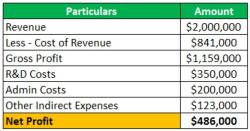How do you calculate gross - up wages?
Calculating gross-up wages involves determining the total amount of compensation needed to ensure that an employee receives a specified net pay after accounting for taxes and other deductions. Here's a simplified guide to calculating gross-up wages:
Determine Net Pay: Start by determining the desired net pay amount that the employee should receive after deductions. This is the amount the employee will take home after taxes and other deductions have been withheld.
Estimate Tax Withholdings: Estimate the total amount of taxes and other deductions that will be withheld from the employee's pay. This typically includes federal income tax, state income tax (if applicable), Social Security tax, Medicare tax, and any other applicable deductions such as retirement contributions or health insurance premiums.
Calculate Gross Pay: Use the following formula to calculate the gross pay needed to achieve the desired net pay:
Gross Pay = Net Pay / (1 - Total Tax Rate)
Where:
- Gross Pay is the total amount of compensation before taxes and deductions.
- Net Pay is the desired amount of take-home pay after deductions.
- Total Tax Rate is the sum of all tax rates expressed as a decimal. For example, if the total tax rate is 25%, you would use 0.25 in the formula.
Account for Other Deductions: If there are other deductions besides taxes that need to be accounted for, such as retirement contributions or health insurance premiums, subtract these amounts from the gross pay calculated in step 3.
Finalize Gross-Up Amount: The final gross-up amount is the total compensation that the employer needs to pay the employee to ensure that they receive the desired net pay after taxes and deductions.
It's important to note that calculating gross-up wages can be complex due to varying tax rates, deductions, and other factors. Employers may also need to consider legal and regulatory requirements when determining gross-up amounts. Consulting with a tax professional or payroll specialist may be advisable to ensure accuracy and compliance with applicable laws and regulations.
Gross-Up Wages: Understanding the Math and Considerations
1. Calculating Gross-Up Wages:
Gross-up wages represent the pre-tax amount an employer needs to pay to achieve a specific net pay amount for the employee after accounting for taxes and deductions. The basic formula is:
Gross-Up Wage = Net Pay / (1 - Tax Rate)
- Net Pay: Desired net amount the employee receives after taxes and deductions.
- Tax Rate: The combined rate of applicable taxes (e.g., federal income tax, state income tax, Social Security, Medicare).
Example: An employee wants a net pay of $1,000. Assuming a combined tax rate of 25%, the gross-up wage would be:
Gross-Up Wage = $1,000 / (1 - 0.25) = $1,333.33
2. Influencing Factors:
- Tax Rates: Different tax brackets and applicable deductions can affect the gross-up amount.
- Benefits: If employer-sponsored benefits are taxable, they need to be factored into the net pay calculation.
- Location: State and local tax rates can vary, impacting the gross-up calculation.
- Deductions: Pre-tax and post-tax deductions affect the net pay calculation and, consequently, the gross-up amount.
3. Legal and Regulatory Considerations:
- Accuracy: It's crucial to accurately calculate gross-up wages to comply with tax regulations and avoid penalties.
- Recordkeeping: Employers must maintain records of gross-up calculations and supporting documents for potential audits.
- Employee Consent: In some cases, employee consent may be required for gross-up arrangements, depending on company policies and local regulations.
Additional Tips:
- Consult with a tax professional or payroll specialist for complex scenarios or specific regulatory requirements.
- Utilize payroll software with built-in gross-up calculation features to ensure accuracy and efficiency.
- Stay updated on changes in tax laws and regulations that may impact gross-up calculations.
Remember, gross-up wages are a valuable tool for employers to provide employees with desired net pay amounts while ensuring compliance with tax regulations. However, it's crucial to understand the calculations, influencing factors, and legal considerations involved to use them effectively.













